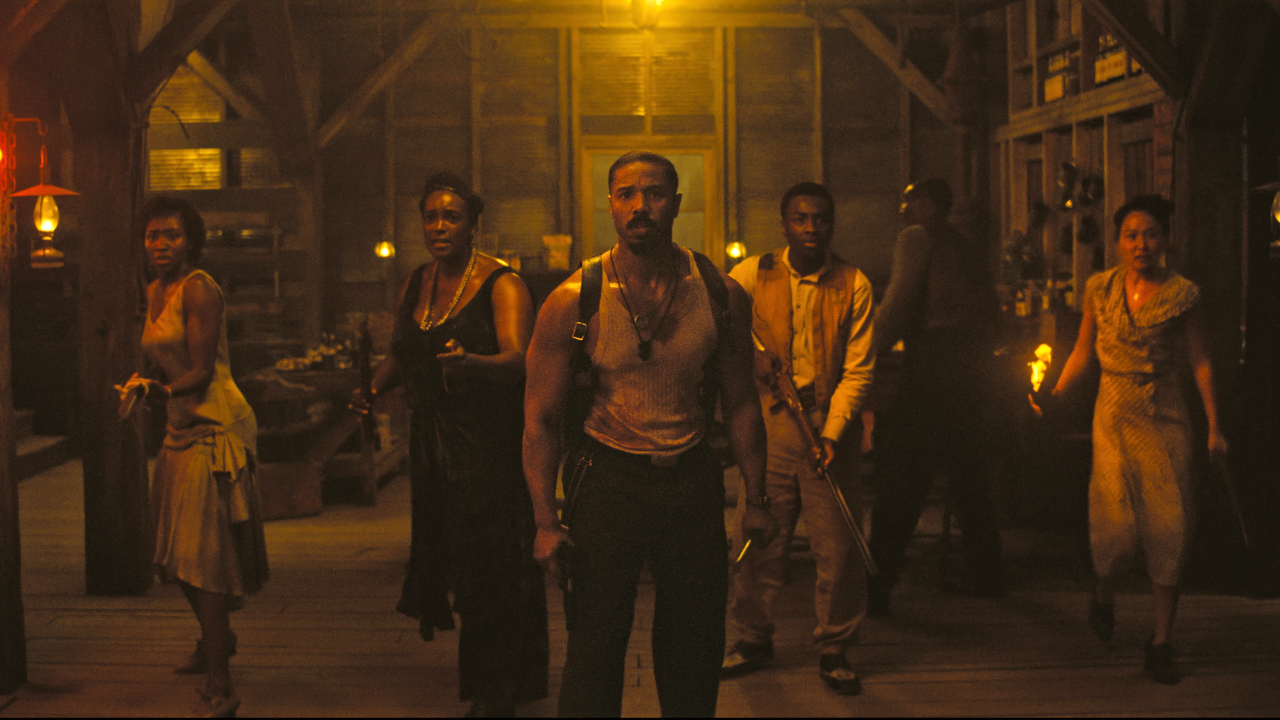Interview: Everything Must Go's Will Ferrell, C.J. Wallace And Writer/Director Dan Rush

Will Ferrell has made us laugh uproariously for much of the last decade as he perfected the man-baby persona, but that’s not what’s on display in Everything Must Go. An adaptation of the Raymond Carver story “Why Don't You Dance,” the film is a dark dramedy showcasing the comedian in a whole new light while also making audiences pay attention to two fast rising talents: writer/director Dan Rush and C.J. Wallace.
A couple weeks ago I was invited to attend a press conference where the three men gathered to discuss the film at length, answering reporters’ questions. Check out their answers below, where they talk about speedboat love, buying yard sale mouthwash and not trying to find the humor in alcoholism.
It seemed like [Will and Christopher] had natural chemistry together. Did you two get together prior to filming this to just get to know each other better?
Will Ferrell: Thank you. Well, Christopher and I spent three weeks in the Grand Canyon together. We took a mule trip down to the bottom, no guides. I left you there for like a week! I said I would come back, turns out it took longer. That’s where most of our bonding took place. No, I think that’s really a credit to how good CJ is. We didn't have a ton of time together before we started filming. We rehearsed a little bit, but, not to speak for Dan, but it’s what we saw in auditioning with Christopher, it seemed like he was already so grounded and mature in a way that would help us. A lot of the scenes that you see in the film were three, four, five takes at the most. We didn't have the time or film stock and all of these forces going against us. We had to make sure that we had someone that could start at level ten on take one.
C.J. Wallace: I can do that.
Ferrell: [Laughs] He can do that.
Wallace: Yeah we really didn't have that much time. I remember reading with him over it on my audition. That was the only time we really got to talk one-on-one.
Your Daily Blend of Entertainment News
Ferrell: Yeah, in between the takes is when we were setting up for the next... we all just hang out in front of this house that we shot at while they rearranged the furniture for a different part of the movie on the front lawn. That’s where we got to know each other.
For all three of you; have you had any real world field research as far as going to yard sales? If so, what is the most interesting thing you found there?
Dan Rush: One of the scenes in the movie where the guy buys mouthwash is based on... I live in Santa Monica, which is like the yard sale capital of the country it seems like and my brother-in law and sister hold these big yard sales. I would go to them and it is just amazing what sells. It would be a piece of that recorder or literally people would buy a quarter bottle of vodka or mouthwash. So that actually came from a real story. It sounds crazy but....
Ferrell: Yeah, I remember going with my mom to a random garage sale as a kid and thinking what a cool treasure hunt that whole world was. Only to transition as an adult to think, “What a gross place that really is.”
Wallace: I don't think I've ever been to yard sale. I mean my neighbors have them, but I don't really need that I guess [laughs].
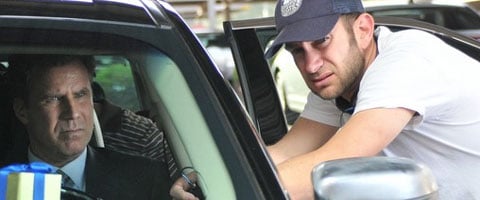
So I saw the film two days ago and yesterday I was walking down Hollywood and saw an apartment with entire front lawn decorated with furniture, couches, a hot tub. I've only been exposed to this movie a day. Are you seeing this everywhere you go now?
Rush: It's funny, we went to London for the film festival, and I see “Everything Must Go” signs. On Canal Street I see them everywhere and I take pictures. When we were doing research on the movie I would go and stopped at all of these different yard sales and what’s weird is the stuff that… it's crazier than it’s actually portrayed in the movie as far as the stuff that people try and get rid of.
What’s the craziest thing you've seen?
Rush: Just people selling underwear; selling an old Mac computer that have 64kb of memory. And people buy it! There are people who go early and try and get deals. They are all looking for that special item, that secret thing that hasn't been discovered.
I want to come back to the bouts of alcoholism issue, I think that that was a fine line to walk. You didn't play if for comedy, it was clearly a part of what was going on in his life. What kind of a challenge was that to portray it realistically not necessarily for comedy, but part of the character’s life?
Rush: We talked about that a lot because that was definitely... at some point we were talking about levels of drunkenness, and how we were going to play it. We both agreed that this was a guy who was an alcoholic who drank but he could function. We felt like he could talk, and have conversations he might slur a little, but he was a functioning alcoholic. We never wanted to play it so that he was sloppy, slurring, I think it was a conscious downplaying of it.
I noticed things like going through a whole six pack and just throwing the cans in the car. You could have looked at that as sort of a comic moment but sort of a tragic comic moment.
Ferrell: Yeah, I'm getting asked the question, “Were you tempted to make that funny.” I don't think that you can sit down and begin to read a piece of material like this, and start earmarking with, “This would be funny! I should barf on myself here. I know how to spice that up.” It's evident from the beginning what the tone is going to be and that’s where you put your mind, so you think of it as serious piece and including the playing of drunk we very cognizant of avoiding having any false moments, and we didn't want the comedy to come…we wanted it to just happen organically, and never feel forced or pushed.
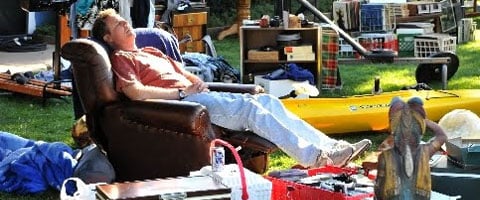
I had another question about the treatment of alcoholism, I've never heard of the 13th step is that a joke or...
Rush: I wouldn't say it's a joke.
Is that something that happens a lot with sponsors and wives?
Rush: I’m trying to think of the best way to answer thisI'm not part of that program, but in my research that’s happened. It's happened enough that there is actually a term for it. It's a really interesting relationship whenever you have that sponsor/sponsie relationship. Someone who is dependent on somebody and I think it can be very useful but it can also be just taken advantage of, just like anything else. It's a term that exists.
For CJ, I was just wondering this is just such an adult movie, and you’re kind of like the conscience of the film in a way, how did you relate of the story line, and what did you think of Will's character, and going through and making the movie?
Wallace: I felt like I was, in a way, a family member – a distant, black family member [laughs] – that would kind of give him guidance in a way, and noticed that whenever we had a scene together he was kind of a better guy. Except for when he yelled at me. Repeat the question again?
It's such an adult story, there is not a lot of roles for kids in movies like this, and I just thought you might have an interesting perspective on this like why can't this guy just get it together.
Wallace: I don't know how to answer that.
Rush: One of the things we’ve talked about is he's probably the least judgmental person. You never were critical of him and we talked about that. I think, also, he’s probably the most mature person in the movie, or maybe he doesn't have enough time to develop problems. It was like, “Just talk to each other,” you know? I think when you're young you don't always realize that stuff is bad.
Ferrell: Plus, its chance for Kenny for contact and companionship and friendship. The other stuff seems messed up but I kinda don't care as long as we have that relationship.
Rush: Adults typically don't make fun of children, except for your character.
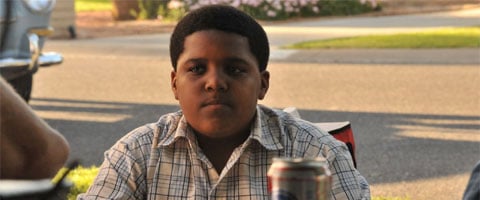
It's a Raymond Carver story, you guys took some liberties with the actual literary part of it. I just want to know what you guys...
Rush: The literary part of it meaning…
It's a four page story.
Rush: Yeah correct, so yeah we expanded it. Well it's always a story that I loved it had this image that I couldn't shake which is this guy living on his lawn outside as if it were inside, there is this rear window reversal thing that I always thought was fascinating. So there was that and there is also this idea that you have this guy with a perfect storm of conflict, like of crisis. So it was a great thing to kind of put a stake in the ground and go, “How did this guy get here?” Because in the story you have no idea really how he got here, and then where does he go from here. So it’s like a great thing to kinda build on both sides. I knew there would be a moment where some kind of lost soul woman who he would either dance with or hug at the end and there was this set up. It was about, I think, filling that role with other broken characters like The Wizard of Oz. Everybody needs something. It was a great start. His stories are always so...
They are great stories it seems like everyone is trying to turn his stories into movies, but they are short.
Rush: They are very short, and they were made shorter by his editor.
Do you guys have a material item that you cannot let go of?
Ferrell: Probably my speedboat... Yeah that’s my baby. I don't know. I don't know if I have something I couldn't part with.
Rush: Didn't you say you had a beer tap collection?
Ferrell: I had a beer bottle collection, but I got rid of it so... Do you have anything CJ?
Wallace: Probably like, I used to collect statues.
Rush: Like Greek statues? [laughs]
Wallace: You know, like different sport athletes they come in the boxes.
Ferrell: Like bobble-heads?
Wallace: Yeah but they are actually in the action position. I have a Dan Marino and he's in the quarterback position. I wouldn’t get rid of that
Rush: I have all my old comic books. All of them in plastic.
Wallace: You didn't read them?
Rush: No, I read them.
Wallace: But they’re in plastic?
Rush: Now they are in plastic.
Ferrell: I probably would never part with my ESPYs. A pretty treasured thing.
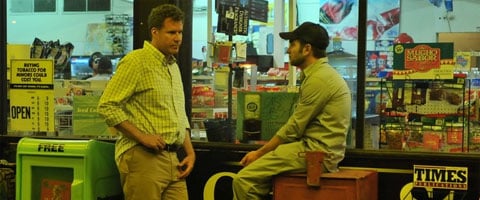
What's the most challenging thing of shooting a film like this, that’s brutally honest, of having a lead actor who is normally a comedian and has comedic, but goes somewhere dark is it getting something like this started is it the shooting itself or is it later when you’re trying to promote and get it out there? What’s the hardest part?
Rush: After I make a movie or a commercial I always do a postmortem, what did I do wrong and what did I do right. The part that made it easy was casting. If you cast correctly, and that’s not saying getting the best actor, it’s getting the right actor for the role, your job is easier. If you cast correctly early on 90%, then 10% is hard. Other way you may not be able to overcome. So these guys were amazing and they helped to overcome the really hard part which is there is never enough time. Every day we were rushing and sacrificing and having to do fewer takes. So that was really hard to go every day, “Gosh, I wish we had done this”, or make sure we were good before we went. Then the next day you gotta start back again. The promotional part has been great. He's been great and people really like him in the movie, and he's great so.
How long was your shoot?
Rush: Four days [laughs].
Ferrell: Four hours [laughs].
Rush: I can't remember if it was 23 or 24, because we started with 22 and go a few extra days. It's fast.
Speaking of casting, can you talk about why CJ was right and how many kids you tested for the role?
Rush: We did a nationwide search, I've worked with a lot kids in commercials and it can be really hard because they have tricks and they don't listen. We had found a couple of kids then our casting director Joanna Colbert was watching Notorious one night and was like that kid is really good. So we brought CJ in he happened to live right next to casting which is great. We narrowed – I don't even think he knows this – we narrowed it down to three kids. I loved how he was just very natural and real and he had an innate sense of timing. Will read with all three kids we flew one in from Texas and I was like this guy. Just the way they talk to each other so natural. I'm so glad because it can also be hard having children on set, but he took less time than him.
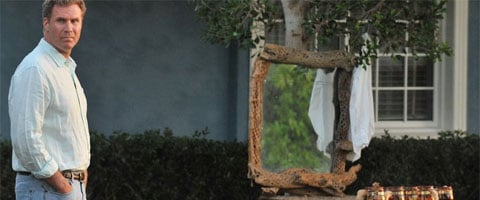
Well you talked about the relationships between your character and CJ's character, I was wondering if you could talk about the relationship between your character and Rebecca Hall's character, did you fall in love a little bit? How would you describe that relationship?
Ferrell: That was another thing that I loved about the script was you know here was this relationship that in a typical Hollywood movie they would fall in love. It feels like it's maybe getting to that edge, in a very real way it doesn't ever cross that line. It's almost symbolic of that dance at the end of the film. It really is a dance that they are consoling each other being critical of each other too, and yet they don't cross that line of intimacy. Yet there is something intimate going on between them really masterfully done on the script level we tried to be true to that.
I was wondering what is up next for all of you guys, and Will if you could address rumors about Anchorman and Zoolander?
Ferrell: Yes, well what's next for me specifically is I'm going to shoot a movie in the fall with Zach Galifianakis, where we are kind of rival southern politicians in a small congressional district in South Carolina. We will release for the election season next year that comments on the circus that is now modern day politics. Zoolander 2 I don't know anything about. Anchorman 2 you really have to assert some sort of email hate camping to Paramount pictures because they have told us they have run the numbers and it's not a good fit.
Was it really intended to be an actual musical?
Ferrell: We were going to do almost a reverse... almost like how the Marx brothers used to do - we were going to do a Broadway musical and then have a film come out after the stage show. Everyone we tell the idea loves it, except for the studio that owns the rights. Ball's in their courts, but they're being idiots.
A couple months ago Adam McKay said that you were developing Step Brothers 2, has there been any forward motion with that?
Ferrell: Yeah, we just sat down with John [C. Reilly] and we were kicking around some ideas. So, you know, maybe. We'll see.
Wallace: I've really been reading for other possible movies, but I'm just trying to get my grades up [laughs]. Hopefully will make the baseball team.
Rush: Just writing, not telling anybody what I'm writing.
Is it an adaptation?
Rush: I'm not writing an adaptation. I never talk about it because I’ve known for a long time that as soon as I start talking about something I stop working on it.
Ferrell: It's hard to talk about future things because as soon as you mention something it goes away. It's like a self-fulfilling curse. You tend to get reluctant to talk about anything until the day before filming.

Can you talk about the music in the film, and also did you consider using the Steely Dan song as the title song?
Rush: Interestingly enough I had titled the movie before that came out. I just want to get that on record.
Ferrell: Is there a Steely Dan song called “Everything Must Go”?
Rush: It’s an album too. We liked the idea of using music that his father would have played. We had a really great music supervisor who found us really interesting music, and he's really music passionate…music passionate. What does that mean?
Ferrell: I’m a cancer, I’m music passionate. I like ling walks on the beach…
Rush: So we picked a lot of that music together and it was a great opportunity also because of financial restraints so we pulled people like Odetta, and Randal Jack Elliot who are in that folk rock blend. What would his dad have had that he would have played when he was growing up.
Ferrell: Dan is giving me far too much credit cause so much of that was his choices and his decision making.

Eric Eisenberg is the Assistant Managing Editor at CinemaBlend. After graduating Boston University and earning a bachelor’s degree in journalism, he took a part-time job as a staff writer for CinemaBlend, and after six months was offered the opportunity to move to Los Angeles and take on a newly created West Coast Editor position. Over a decade later, he's continuing to advance his interests and expertise. In addition to conducting filmmaker interviews and contributing to the news and feature content of the site, Eric also oversees the Movie Reviews section, writes the the weekend box office report (published Sundays), and is the site's resident Stephen King expert. He has two King-related columns.
